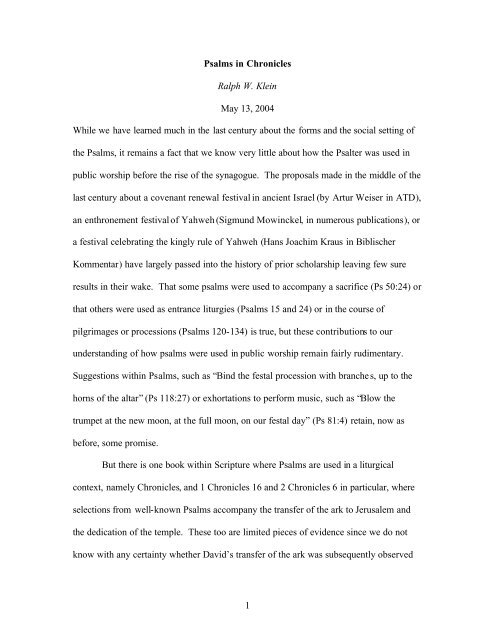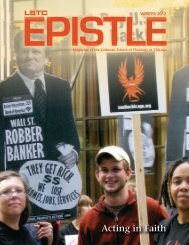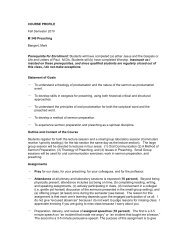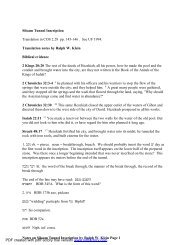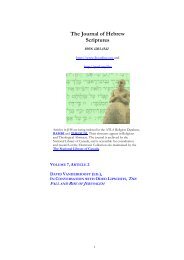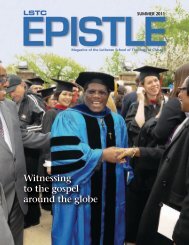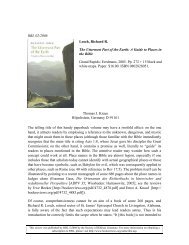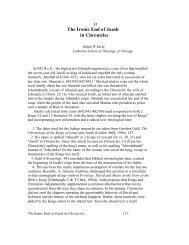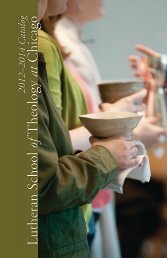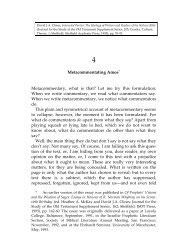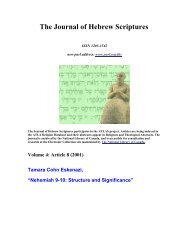1 Psalms in Chronicles Ralph W. Klein May 13, 2004 While we have ...
1 Psalms in Chronicles Ralph W. Klein May 13, 2004 While we have ...
1 Psalms in Chronicles Ralph W. Klein May 13, 2004 While we have ...
You also want an ePaper? Increase the reach of your titles
YUMPU automatically turns print PDFs into web optimized ePapers that Google loves.
<strong>Psalms</strong> <strong>in</strong> <strong>Chronicles</strong><strong>Ralph</strong> W. Kle<strong>in</strong><strong>May</strong> <strong>13</strong>, <strong>2004</strong><strong>While</strong> <strong>we</strong> <strong>have</strong> learned much <strong>in</strong> the last century about the forms and the social sett<strong>in</strong>g ofthe <strong>Psalms</strong>, it rema<strong>in</strong>s a fact that <strong>we</strong> know very little about how the Psalter was used <strong>in</strong>public worship before the rise of the synagogue. The proposals made <strong>in</strong> the middle of thelast century about a covenant renewal festival <strong>in</strong> ancient Israel (by Artur Weiser <strong>in</strong> ATD),an enthronement festival of Yah<strong>we</strong>h (Sigmund Mow<strong>in</strong>ckel, <strong>in</strong> numerous publications), ora festival celebrat<strong>in</strong>g the k<strong>in</strong>gly rule of Yah<strong>we</strong>h (Hans Joachim Kraus <strong>in</strong> BiblischerKommentar) <strong>have</strong> largely passed <strong>in</strong>to the history of prior scholarship leav<strong>in</strong>g few sureresults <strong>in</strong> their wake. That some psalms <strong>we</strong>re used to accompany a sacrifice (Ps 50:24) orthat others <strong>we</strong>re used as entrance liturgies (<strong>Psalms</strong> 15 and 24) or <strong>in</strong> the course ofpilgrimages or processions (<strong>Psalms</strong> 120-<strong>13</strong>4) is true, but these contributions to ourunderstand<strong>in</strong>g of how psalms <strong>we</strong>re used <strong>in</strong> public worship rema<strong>in</strong> fairly rudimentary.Suggestions with<strong>in</strong> <strong>Psalms</strong>, such as “B<strong>in</strong>d the festal procession with branches, up to thehorns of the altar” (Ps 118:27) or exhortations to perform music, such as “Blow thetrumpet at the new moon, at the full moon, on our festal day” (Ps 81:4) reta<strong>in</strong>, now asbefore, some promise.But there is one book with<strong>in</strong> Scripture where <strong>Psalms</strong> are used <strong>in</strong> a liturgicalcontext, namely <strong>Chronicles</strong>, and 1 <strong>Chronicles</strong> 16 and 2 <strong>Chronicles</strong> 6 <strong>in</strong> particular, whereselections from <strong>we</strong>ll-known <strong>Psalms</strong> accompany the transfer of the ark to Jerusalem andthe dedication of the temple. These too are limited pieces of evidence s<strong>in</strong>ce <strong>we</strong> do notknow with any certa<strong>in</strong>ty whether David’s transfer of the ark was subsequently observed1
liturgically or <strong>in</strong> a procession that recited these <strong>Psalms</strong> (but see Psalm <strong>13</strong>2), but <strong>we</strong> do<strong>have</strong> examples here of how <strong>Psalms</strong> <strong>we</strong>re <strong>in</strong>terpreted or reapplied <strong>in</strong> late Persian times.One supposes that the Chronicler’s assignment of psalms to these liturgies did not strikehis readers as absurd. Incidentally this reuse and rewrit<strong>in</strong>g of these <strong>Psalms</strong> also suggestthat the Psalter probably had not reached its f<strong>in</strong>al canonical form when <strong>Chronicles</strong> waswritten, as is also <strong>in</strong>dicated by the variant order of Books 4 and 5 of the Psalter <strong>in</strong> the<strong>Psalms</strong> scroll from Cave 11 at Qumran.1 <strong>Chronicles</strong> 16:8-36 (see the handout) consists of excerpts from three canonicalpsalms: Psalm 105:1-15; Psalm 96:1-<strong>13</strong>; and Psalm 106:1, 47-48 (all from Book IV ofthe Psalter).Psalm 105 is a psalm of thanksgiv<strong>in</strong>g. After a call to give thanks for Yah<strong>we</strong>h’swonderful works (vv. 1-6), the Psalm recounts Yah<strong>we</strong>h’s efforts on Israel’s behalf <strong>in</strong> thepast, <strong>in</strong>clud<strong>in</strong>g his covenant with and care for the matriarchs and patriarchs (vv. 7-15), hisprovision of Joseph to save Israel from fam<strong>in</strong>e (vv. 16-22), his liberation of Israel fromthe hardships of Egypt (vv. 23-38), his supply<strong>in</strong>g Israel with food and dr<strong>in</strong>k dur<strong>in</strong>g thewilderness wander<strong>in</strong>g (vv. 39-42), and f<strong>in</strong>ally his gracious gift of the Land (vv. 43-45).Only the first fifteen verses of this Psalm are <strong>in</strong>cluded <strong>in</strong> 1 <strong>Chronicles</strong> 16. Were the nextthirty verses—with the mention of plagues and the dread that afflicted Egypt--consideredtoo potentially revolutionary for the context <strong>in</strong> which the Chronicler wrote?Psalm 106, another hymn of praise (mixed with a theology similar to that of theDeuteronomistic History), provides a history of s<strong>in</strong> and judgment <strong>in</strong> Israel. The psalmistpraises Yah<strong>we</strong>h for rema<strong>in</strong><strong>in</strong>g faithful to God’s people despite their long history of s<strong>in</strong>and apostasy. Periods of s<strong>in</strong> (vv. 6-7 [<strong>in</strong> Egypt and at the Red Sea], <strong>13</strong>-14 [<strong>in</strong> their2
ebellions <strong>in</strong> the wilderness], 16 [<strong>in</strong> rebell<strong>in</strong>g aga<strong>in</strong>st Moses and Aaron], 19-22 [<strong>in</strong> the<strong>in</strong>cident with the golden calf], 24-25 [<strong>in</strong> the <strong>in</strong>cident with the doubt<strong>in</strong>g spies], 28 [<strong>in</strong> theirapostasy at Baal Peor], 32-39 [<strong>in</strong> apostasy dur<strong>in</strong>g the period of the judges and later], 43band their frequent subsequent rebellions) <strong>we</strong>re follo<strong>we</strong>d by periods of judgment (vv. 15,17-18, 26-27, 29, 40-42, 43c), and then aga<strong>in</strong> and aga<strong>in</strong> by periods of Yah<strong>we</strong>h’scompassionate protection and deliverance (vv. 8-12, 23, 30-31, 43a, 44-46). The last twoverses of the psalm are a prayer for deliverance from the exile (v. 47) and the conclusionto Book IV of the Psalter (v. 48). Of these forty-eight verses, only the first verse and thelast two make it <strong>in</strong>to the new psalm <strong>in</strong> 1 <strong>Chronicles</strong> 16. Ironically, none of the verses thatgive this psalm its identity—s<strong>in</strong>, judgment, div<strong>in</strong>e compassion, protection, anddeliverance—make it <strong>in</strong>to 1 <strong>Chronicles</strong> 16.Psalm 96 is a third hymn of praise. After a call to praise <strong>in</strong> vv. 1-3, the reasonsfor praise are given <strong>in</strong> vv. 4-6, namely Yah<strong>we</strong>h’s superiority over all other gods. Asecond call to praise takes place <strong>in</strong> vv. 7-9, follo<strong>we</strong>d by a proclamation that Yah<strong>we</strong>h isk<strong>in</strong>g and judge of all the earth, both now and <strong>in</strong> the future (vv. 10-<strong>13</strong>). This Psalm is<strong>in</strong>cluded bet<strong>we</strong>en <strong>Psalms</strong> 105 and 106 <strong>in</strong> 1 <strong>Chronicles</strong> 16. The only omitted l<strong>in</strong>es are vs.96:10b “he will judge the nations with equity” and 96:<strong>13</strong>b “he will just the world withrighteousness, and the peoples with his truth.” The Chronicler may <strong>have</strong> found it moreappropriate for the people to hope for some manifestation of Yah<strong>we</strong>h’s sovereignty <strong>in</strong>nature than for them to declare Yah<strong>we</strong>h’s sovereignty <strong>in</strong> history conv<strong>in</strong>c<strong>in</strong>gly before theirpolitical and military masters.<strong>While</strong> scholars <strong>have</strong> long studied the text critical differences bet<strong>we</strong>en the texts ofthese psalms <strong>in</strong> the Psalter and the copies of them <strong>in</strong> <strong>Chronicles</strong>, it has only recently been3
asked what sort of poem has resulted by putt<strong>in</strong>g these psalms together <strong>in</strong> a new medley oreven <strong>in</strong>to a new poem. Older commentators, such as Myers <strong>in</strong> the Anchor Bible (1:121),referred readers to the Psalm commentaries for further exegesis after a few <strong>in</strong>troductoryremarks. Even Rudolph remarks <strong>in</strong> his still-standard <strong>Chronicles</strong> commentary (p. 128):“Die E<strong>in</strong>zelexegese ist Sache der Psalmenkommentare.” But, of course, that is not so.The Chronicler has composed a new poem and placed it <strong>in</strong> a liturgy celebrat<strong>in</strong>g thearrival of the ark of the covenant <strong>in</strong> Jerusalem. We need to ask what this Psalm and its<strong>in</strong>dividual verses meant <strong>in</strong> that new context.Accord<strong>in</strong>g to the Chronicler, David had already <strong>in</strong> his time <strong>in</strong>augurated thes<strong>in</strong>g<strong>in</strong>g of praises by the Levitical s<strong>in</strong>gers <strong>in</strong> public worship, a practice which wasprobably characteristic of the temple worship known by the Chronicler <strong>in</strong> the mid fourthcentury. That is, he attempted to establish a cont<strong>in</strong>uity bet<strong>we</strong>en the worship life of Davidand that of his won day. David’s authority now stood beh<strong>in</strong>d the role of the Levites andthe use of psalmody <strong>in</strong> worship. The Chronicler’s credibility <strong>in</strong> claim<strong>in</strong>g Davidicauthority for this practice was no doubt enhanced by his reuse of <strong>we</strong>ll-known <strong>Psalms</strong>.What is the structure and message of this new coherent psalm that the Chroniclerput together out of fragments of three other psalms? This psalm consists of three partsthat <strong>we</strong> call I. Israel’s praise, II. <strong>in</strong>ternational praise, and III. cosmic praise. Israel isportrayed as liv<strong>in</strong>g among the nations and its God is proclaimed as sovereign over othergods and the nations. The form of the Psalm is a thanksgiv<strong>in</strong>g, draw<strong>in</strong>g on the firstverses of Psalm 105 and the last verses of Psalm 106. Toward the end there is also a briefpetition. Ho<strong>we</strong>ver the rest of the psalms <strong>in</strong> the Psalter may <strong>have</strong> been composed, thispsalm was put together at a desk, through careful selection and coord<strong>in</strong>ation of verses4
from known psalms. The context of this psalm is the worship of the temple, and itconveys a feel<strong>in</strong>g of national vulnerability.The open<strong>in</strong>g imperative <strong>in</strong> v. 8, from Psalm 105, “Thank Yah<strong>we</strong>h,” is balancedby a similar imperative near the end <strong>in</strong> v. 34, orig<strong>in</strong>ally from Psalm 106: “Give thanksto Yah<strong>we</strong>h for he is good, for his loyalty lasts forever.” The thanksgiv<strong>in</strong>g at thebeg<strong>in</strong>n<strong>in</strong>g of the psalm is for Yah<strong>we</strong>h’s past actions, the exhortation to give thanks at theend of the psalm <strong>in</strong>troduces the petition for Yah<strong>we</strong>h’s <strong>in</strong>tervention now and <strong>in</strong> the future.The concern for “the peoples”—make known his deeds among the peoples--forms asignificant theme throughout this new composition.The psalm urges the Israelite audience to seek Yah<strong>we</strong>h and his strength, to seekhis face cont<strong>in</strong>ually (v. 11). This word “seek” is central to the Chronicler’s theology.David had earlier confessed <strong>in</strong> the ark narrative that Yah<strong>we</strong>h had not been soughtcorrectly <strong>in</strong> the days of Saul. In fact <strong>we</strong> will speak later of the four virtues of theChronicler’s theology: to humble oneself, to pray, to seek Yah<strong>we</strong>h’s face, and to turnfrom evil do<strong>in</strong>gs (2 Chr 7:14).The reference to Yah<strong>we</strong>h’s strength is apparently anallusion to the ark, whose journey from Kiriath-jearim to Jerusalem has taken up the lastfour chapters (1 <strong>Chronicles</strong> <strong>13</strong>-16). 2 <strong>Chronicles</strong> 6:41, which <strong>we</strong> will look at later, alsorefers to Yah<strong>we</strong>h and his strong ark.The judgments of Yah<strong>we</strong>h’s mouth (v. 12) are universally effective accord<strong>in</strong>gto v. 14: they are “<strong>in</strong> all the earth,” and this is complementary to the particularconfession <strong>in</strong> that same verse: “He is Yah<strong>we</strong>h our God.” The Chronicler focuses hisexhortation on the faithful community, here called the seed of Israel and the children ofJacob (v. <strong>13</strong>). “Israel”/Jacob is the most important of the ancestors <strong>in</strong> <strong>Chronicles</strong>. Psalm5
105 had referred to the seed of Abraham and the children of Jacob, the descendants oftwo different ancestral <strong>in</strong>dividuals.Psalm 105:12 had said that Yah<strong>we</strong>h had remembered his covenant with thematriarchs and patriarchs. Now the Chronicler turns that <strong>in</strong>dicative <strong>in</strong>to an imperative forhis audience: You, remember God’s eternal covenant (v. 15). Yah<strong>we</strong>h’s covenantwith Israel and his covenantal loyalty (v. 34) are both confessed to be everlast<strong>in</strong>g, whilehis word (or promise) is said to last for a thousand generations (v. 15). Though Genesisactually reports only God’s covenant with Abraham, that ancestral covenant is herevouchsafed to all three major ancestors: Abraham and Isaac (v. 16) and Jacob/Israel(v. 17). This everlast<strong>in</strong>g div<strong>in</strong>e covenant, as <strong>in</strong> the priestly document <strong>in</strong> the Pentateuch(Gen 17:8; Exod 6:8), guarantees to Israel the possession of the land (v. 18).In v. 18, the Chronicler moves out of the objective mode, <strong>in</strong> which he has beenreferr<strong>in</strong>g to Israel’s ancestors as people long s<strong>in</strong>ce gone by, and he addresses his audienceas “you,” aga<strong>in</strong> chang<strong>in</strong>g the text of Psalm 105:12. The Chronicler’s own audience hadsurely known what it meant to be few <strong>in</strong> number, <strong>in</strong>significant sojourners <strong>in</strong> a foreignland. Their experience echoes that of their ancient matriarchs and patriarchs. Yah<strong>we</strong>hhad allo<strong>we</strong>d no one to oppress those ancient ancestors (v. 21). The Chronicler’saudience would surely <strong>have</strong> heard a startl<strong>in</strong>g contrast <strong>in</strong> this verse bet<strong>we</strong>en the patriarchs’freedom from oppression and their own current experience under the Persians. But thepromises made to vulnerable Abraham and Sarah had freed them from harm; and that,ultimately, would be contemporary Israel’s fate as <strong>we</strong>ll.The value placed on by the ancestors is exemplified by their dist<strong>in</strong>ctive titles: Donot touch my ano<strong>in</strong>ted ones; do no harm to my prophets (v. 22). The Chronicler may6
also <strong>have</strong> applied this verse to his present situation, treat<strong>in</strong>g contemporary Israel as aroyal and prophetic people, and thus democratiz<strong>in</strong>g these terms so that they applied to thewhole people of God. The Chronicler expected his politically <strong>in</strong>significant audience toidentify with the ancient matriarchs and patriarchs, <strong>in</strong> their vulnerability and <strong>in</strong> theirfreedom from harm.International PraiseAt this po<strong>in</strong>t the Chronicler moves to the second po<strong>in</strong>t of his new psalm, theemphasis on <strong>in</strong>ternational praise, and it is probably only <strong>we</strong> who can look up the sourceof his quotation who recognize that he has also moved from Psalm 105 to Psalm 96.Those addressed <strong>in</strong> the new, Chronistic Psalm change: previously it was Israel, now it isthe nations. The Chronicler drops the first l<strong>in</strong>e of Psalm 96—S<strong>in</strong>g to Yah<strong>we</strong>h a newsong—either because he thought a new song would be <strong>in</strong>appropriate <strong>in</strong> an <strong>in</strong>vitationaddressed to a non-Israelite audience, or because he considered such an <strong>in</strong>vitation<strong>in</strong>appropriate <strong>in</strong> the middle of a Psalm. Here he <strong>in</strong>vites the nations (v. 24) and thepeoples (v. 28) to celebrate <strong>in</strong> advance Yah<strong>we</strong>h’s eschatological victories. Later creationas a whole will also be <strong>in</strong>vited to praise Yah<strong>we</strong>h (vv. 31-33).The Chronicler’s theology is monotheistic, or at least strongly monolatrous: Thegods of the people are idols, but Yah<strong>we</strong>h made the heavens (26). Strength and joyare <strong>in</strong> his place (v. 27). <strong>While</strong> joy and rejoic<strong>in</strong>g are frequent <strong>in</strong> <strong>Chronicles</strong>, also <strong>in</strong>chapter 16, this is the only time the Chronicler uses this particular Hebrew word for joy.The Chronicler uses “place” <strong>in</strong>stead of “sanctuary” (Ps 96:6) because <strong>in</strong> the Jerusalemof David’s time, accord<strong>in</strong>g to the Chronicler, there <strong>we</strong>re no sacrifices at Jerusalem, notemple, but only the ark, with its tent, and the service of song (1 Chr 16:4-6, 37-38).7
Psalm 96, of course, clearly presupposed the existence of the temple. This “place” is forthe Chronicler only the location where Solomon’s temple will one day stand.Verses 28-29 (Ascribe to Yah<strong>we</strong>h, O families of the peoples), as <strong>in</strong> Psalm 96:6-8,are addressed to the nations. A similar exhortation <strong>in</strong> Ps 29:1-2 is addressed to the “sonsof God,” the members of Yah<strong>we</strong>h’s heavenly council. Lift up an offer<strong>in</strong>g and come<strong>in</strong>to his presence. Verses 28-30 explicitly <strong>in</strong>vite the nations of the world to worshipYah<strong>we</strong>h. They are <strong>in</strong>vited <strong>in</strong>to Yah<strong>we</strong>h’s presence (v. 29), not <strong>in</strong>to his courts as <strong>in</strong> Ps96:8, to avoid the anachronism of <strong>in</strong>vit<strong>in</strong>g foreigners at the time of David to worship <strong>in</strong>the temple that was first erected by Solomon. The offer<strong>in</strong>g they br<strong>in</strong>g is a k<strong>in</strong>d of tributedue to the div<strong>in</strong>e k<strong>in</strong>g. As <strong>we</strong> noted earlier, the Chronicler omitted Ps 96:10b: “He willjudge the peoples with equity.” He may not <strong>have</strong> wanted to alarm the Persians aboutIsrael’s <strong>in</strong>ternational goals.Cosmic praiseLet the heavens rejoice…let the earth be glad…let the sea roar….(vv. 31-32).The Chronicler <strong>in</strong>vites the whole tripartite cosmos—heaven, earth, and sea--to jo<strong>in</strong> <strong>in</strong> thecelebration of Yah<strong>we</strong>h’s k<strong>in</strong>gship. He moved the last l<strong>in</strong>e <strong>in</strong> v. 31 let them say amongthe nations, Yah<strong>we</strong>h is God, and rewrote it s<strong>in</strong>ce <strong>in</strong> Ps 96:10a it is an exhortation toIsrael to bear witness to the nations. Now the nations themselves are to herald Yah<strong>we</strong>h’sk<strong>in</strong>gship. Let the field…and trees of the forest (vv. 32-33). Agricultural land andstands of trees <strong>in</strong> the forest, too, are urged <strong>in</strong> an apostrophe—a direct appeal to ananimate or <strong>in</strong>animate object—to jo<strong>in</strong> <strong>in</strong> the chorus that celebrates Yah<strong>we</strong>h’s com<strong>in</strong>g tojudge, or rule, the earth.F<strong>in</strong>al Call to Thanksgiv<strong>in</strong>g8
To articulate this f<strong>in</strong>al exhortation, made to Israel, the Chronicler has reached <strong>in</strong>toanother psalm, the first verse and last two verses of Psalm 106, but the transition aga<strong>in</strong> isso smooth that <strong>we</strong> would not notice it without look<strong>in</strong>g it up. All he had to omit was theopen<strong>in</strong>g “Hallelujah.” He ends his new psalm <strong>in</strong> 1 <strong>Chronicles</strong> 16. as he began, withgiv<strong>in</strong>g thanks to Yah<strong>we</strong>h who is good and whose loyalty lasts forever. Variations onthis slogan appear aga<strong>in</strong> <strong>in</strong> v. 41 <strong>in</strong> this chapter and no less than six times <strong>in</strong> 2 <strong>Chronicles</strong>.Petition for Israel’s DeliveranceBy add<strong>in</strong>g the words “And say” to the quotation from Psalm 106 (v. 35), theChronicler emphasizes that his audience is to make the follow<strong>in</strong>g prayer their own.Instead of referr<strong>in</strong>g to “Yah<strong>we</strong>h our God,” as <strong>in</strong> Ps 146:47, the Chronicler refers to thedeity as O God of our salvation. This may <strong>have</strong> seemed more appropriate <strong>in</strong> a petitionask<strong>in</strong>g God to save or deliver the people.Gather us and deliver us from the nations. In Psalm 106:47 the imperative“gather” reflected the scattered or exiled condition of the people addressed. Exile hadalready been threatened <strong>in</strong> the wilderness (Ps 106:47) and had become a reality later <strong>in</strong>the psalm (vv. 40-46). To this quotation the Chronicler added the words “deliver us.”Deliverance from Persian dom<strong>in</strong>ation may <strong>have</strong> been a more burn<strong>in</strong>g issue than Israel’sdispersal at the Chronicler’s time even if, for political reasons, that author avoided adirect criticism of, or an attack upon, the Persians. Gather<strong>in</strong>g Israel from the nations, ofcourse is appropriate for almost any time when the Chronicler may <strong>have</strong> been writ<strong>in</strong>g.Blessed be Yah<strong>we</strong>h the God of Israel (v. 36). The Chronicler’s Psalmconcludes with the same div<strong>in</strong>e title—Yah<strong>we</strong>h the God of Israel--which was the object ofthe <strong>in</strong>vocation, thanksgiv<strong>in</strong>g, and praise of the s<strong>in</strong>gers <strong>in</strong> the narrative <strong>in</strong>troduction to this9
chapter, v. 4., just before this new psalm began. This bless<strong>in</strong>g with this full div<strong>in</strong>e titlelater appears <strong>in</strong> the mouth of Hiram, k<strong>in</strong>g of Tyre (2 Chr 2:11 [12]) and of Solomonhimself (2 Chr 6:4).And all the people said, “Amen, and praise Yah<strong>we</strong>h.” (v. 36) These words arepart of the doxology at the end of Psalm 106 and not really part of the psalm itself. They<strong>in</strong>dicate to us of course that the fourth book of the Psalter was completed by the time ofthe Chronicler. All the people accord<strong>in</strong>g to the Chronicler had jo<strong>in</strong>ed David <strong>in</strong> br<strong>in</strong>g<strong>in</strong>gthe ark back to Jerusalem—ho<strong>we</strong>ver unlikely that is historically--and now they endorsethe song of the Levites. This f<strong>in</strong>al doxology serves as a bridge passage to take theChronicler back to his ark narrative.This psalm is a good example of the doxological character of worship <strong>in</strong><strong>Chronicles</strong>. <strong>While</strong> <strong>in</strong> the century before him, both Ezra and Nehemiah had expressed anarrow view of Israel, that required forced divorces from those who <strong>we</strong>re not recognizedas true Israelites, the Chronicler has a more expansive view of Israel, beg<strong>in</strong>n<strong>in</strong>g with hisprovid<strong>in</strong>g genealogies for all of the t<strong>we</strong>lve tribes of Israel at the beg<strong>in</strong>n<strong>in</strong>g of his work.He <strong>in</strong>vites all Israel to rally round the temple <strong>in</strong> Jerusalem, and he breaks through eventhe boundaries of Israel <strong>in</strong> this psalm as he exhorts the nations and even the entire cosmosto praise Yah<strong>we</strong>h.2 <strong>Chronicles</strong> 6:40-42We move now to the brief excerpts from Psalm <strong>13</strong>2 (see the next part of thehandout) that appear as the conclusion of Solomon’s long prayer at the dedication of thetemple <strong>in</strong> 2 Chr 6:14-39. In the course of his prayer, Solomon had prayed for Yah<strong>we</strong>h to10
egard to what <strong>we</strong> would call the first commandment, and threatens that such apostasywould lead to exile and to the destruction of the temple.The Chronicler took over this theophany from 1 K<strong>in</strong>gs 9 <strong>in</strong> 2 Chr 7:12-22,expanded it, made additional changes and, <strong>in</strong> my judgment, radically redirected its focus.The first paragraph (p. 3 of the handout) beg<strong>in</strong>s with the <strong>in</strong>troductory paragraph fromK<strong>in</strong>gs, but then <strong>in</strong>serts with<strong>in</strong> it a major paragraph that outl<strong>in</strong>es what pious Israelitesshould do <strong>in</strong> case of national calamity— I <strong>have</strong> entitled this additional paragraph thePositive response of the people. <strong>While</strong> this paragraph is cast as a div<strong>in</strong>e oracle it surelyis a clear presentation of the author’s own view. This <strong>in</strong>serted paragraph beg<strong>in</strong>s and endswith Yah<strong>we</strong>h’s choice of the temple: “I <strong>have</strong> chosen this place” and “For now I <strong>have</strong>chosen.” In the temple prayer itself, <strong>in</strong> ch. 6, Solomon had mentioned a variety ofpossible disasters that might occur, <strong>in</strong>clud<strong>in</strong>g, defeat <strong>in</strong> war and exile, but <strong>in</strong> this newadditional paragraph the Chronicler only mentions the k<strong>in</strong>ds of dangers that faced thecommunity of his day—drought, locusts, and pestilence. In case of such calamities,Solomon urges the people to humble themselves, pray, seek Yah<strong>we</strong>h’s face, and turnfrom their evil do<strong>in</strong>gs. That is, they are not to just pray <strong>in</strong> or toward the temple asSolomon had asked, but they are to participate fully <strong>in</strong> a transformed religious life.These four virtues crop up time and aga<strong>in</strong> <strong>in</strong> the balance of the Chronicler’s story. 1Butat the conclusion to his book, when Jerusalem falls, the Chronicler s<strong>in</strong>gles out the lastk<strong>in</strong>g Zedekiah for specific criticism: he did not humble himself (2 Chr 36:12) and he didnot turn to Yah<strong>we</strong>h (2 Chr 36:<strong>13</strong>). The dawn<strong>in</strong>g of a new age <strong>in</strong> the last verses of1 Humble themselves: Rehoboam, the northern tribes of Asher, Manasseh and Zebulun, Hezekiah,Manasseh, and Josiah.Pray: Hezekiah and ManassehSeek Yah<strong>we</strong>h’s face: the faithful at the time of Rehoboam, Asa, and JehoshaphatTurn: Asa, Hezekiah.16
<strong>Chronicles</strong> had noth<strong>in</strong>g to do with the behavior of its k<strong>in</strong>gs or the hope for a restorationof the monarchy, but only with the benefactions of Cyrus, the Persian k<strong>in</strong>g, whose spiritYah<strong>we</strong>h had stirred up, to send the Jews home to build the temple. In this paragraph<strong>in</strong>serted <strong>in</strong> ch. 7, <strong>in</strong> any case, the emphasis is also exclusively on the people and thetemple, there is not a word about the responsibility of the k<strong>in</strong>g. The people are the onesover whom Yah<strong>we</strong>h’s name is called, just as that name is called over the temple <strong>in</strong> 2 Chr6:33.By the time of the Chronicler the post-exilic community had existed for a centuryand a half with a fully function<strong>in</strong>g temple but without a k<strong>in</strong>g. If the Chronicler had feltany need for the re<strong>in</strong>stitution of the monarchy, he would <strong>have</strong> had to make a strong casefor it. Instead, his additional paragraph puts the onus of responsibility exclusively on thepeople. Yah<strong>we</strong>h promises to forgive—for which Solomon had repeatedly prayed <strong>in</strong> 2Chr 6:21, 25, 27, 30, and 39—and to heal provided that Israel humbles itself, prays, seeksYah<strong>we</strong>h’s face, and repents. At the time of judgment <strong>in</strong> 2 Chr 36:16 there was no heal<strong>in</strong>gbecause of the s<strong>in</strong>s of the k<strong>in</strong>g and the people. But the promise <strong>in</strong> this programmaticverse is that there will always be forgiveness and heal<strong>in</strong>g for those who wholeheartedlyparticipate <strong>in</strong> Israel’s religious life and <strong>in</strong> the temple’s worship.When the Chronicler rejo<strong>in</strong>s the Vorlage of K<strong>in</strong>gs <strong>in</strong> v. 16, after his <strong>in</strong>sertedparagraph, the emphasis is on the permanence of Yah<strong>we</strong>h’s commitment to the temple—his name will be there forever, his eyes and heart always. He even does not <strong>in</strong>clude areference to Solomon’s build<strong>in</strong>g of the house from the Vorlage <strong>in</strong> K<strong>in</strong>gs: “which you<strong>have</strong> built to put my name there” (see the left hand box).17
The Chronicler does <strong>in</strong>clude an equivalent for vv. 4-5, the conditional dynasticpromise to the house of David. But this conditional promise is relativized by be<strong>in</strong>gpreceded and follo<strong>we</strong>d by longer paragraphs deal<strong>in</strong>g with the positive and negativeconsequences of community behavior. There are also four changes <strong>in</strong> this paragraph thatneed discussion. The first is the omission of “with a perfect heart and withuprightness.” This does not change the mean<strong>in</strong>g of the text appreciably and theChronicler elsewhere also deemphasizes the comparison with David (cf. 2 Chr 1:8//1 Kgs3:6). The second change is the replacement of the word “promised” with “made acovenant,” which seem to be roughly synonymous. Some scholars <strong>have</strong> proposed thatthis results from a copyist’s error: dbrty was miswritten as krty. The third change occurs<strong>in</strong> the last words of the paragraph where the Chronicler expresses the dynastic hope <strong>in</strong>words known elsewhere only <strong>in</strong> Mic 5:1. But this word<strong>in</strong>g is found already <strong>in</strong> 1 Kgs 9:5LXX so whatever difference <strong>in</strong> emphasis is <strong>in</strong>volved, if any, cannot be attributed to theChronicler himself but only <strong>in</strong> his variant copy of the book of K<strong>in</strong>gs. The one omissionrema<strong>in</strong><strong>in</strong>g that can be attributed to the Chronicler, the reference to Davidic k<strong>in</strong>gship overIsrael forever, fits with our thesis that the Chronicler placed little or no emphasis on there<strong>in</strong>stitution of the monarchy. <strong>While</strong> he reta<strong>in</strong>ed both references <strong>in</strong> the previousparagraph to Yah<strong>we</strong>h’s permanent residence <strong>in</strong> the temple, he deleted the permanencereference when it came to the house of David.In the f<strong>in</strong>al paragraph of 2 <strong>Chronicles</strong> 7 (vv. 19-22), he follows the text of hisVorlage fairly consistently. He deletes the words “and your descendants” s<strong>in</strong>ce theChronicler believed that retribution took place <strong>in</strong> each person’s lifetime and there was18
no heap<strong>in</strong>g up of guilt, as <strong>in</strong> the Deuteronomistic History. The other more or less m<strong>in</strong>orchanges <strong>in</strong> this paragraph need not bother us at this time.What is clear is that the Chronicler <strong>in</strong> 2 <strong>Chronicles</strong> 7 has put his emphasis on thepositive and negative consequences of the behavior of the people as a whole, or, <strong>in</strong> thecase of negative behavior, on the actions of the k<strong>in</strong>gs and the people as a whole. His callfor renewal comes <strong>in</strong> his <strong>in</strong>serted paragraph, <strong>in</strong> which the k<strong>in</strong>g plays no role, just as thek<strong>in</strong>g had played no role <strong>in</strong> the period of reconstruction up to the Chronicler’s time. Whenk<strong>in</strong>gs like Hezekiah are praised <strong>in</strong> the Chronicler’s history, it is as religious leaders whohumble themselves, pray, seek the face of Yah<strong>we</strong>h, and repent. The Chronicler seemsto <strong>have</strong> had no great desire of or hope for a future k<strong>in</strong>g from the l<strong>in</strong>e of David. His newpsalm, 2 Chr 6:41-42, created from fragments of Psalm <strong>13</strong>2, lacks completely the latter’smessianic, hymnic emphases. Instead it prays for Yah<strong>we</strong>h to go to his place of rest <strong>in</strong> thetemple, for the priests and loyal folk to receive material bless<strong>in</strong>gs, and for k<strong>in</strong>g Solomonmerely to <strong>have</strong> his long prayer ans<strong>we</strong>red, a prayer that basically asked God to ans<strong>we</strong>r thepeople’s prayers as <strong>we</strong>ll. And of course the last petition that Solomon made, <strong>in</strong> theconclusion to the prayer drafted by the Chronicler is simply this:And now, rise, YHWH God, to your rest,You and your strong ark.<strong>May</strong> your priests, YHWH God, be clothed with victory,<strong>May</strong> your loyal folk rejoice <strong>in</strong> prosperity.YHWH God, do not refuse your ano<strong>in</strong>ted one.19


